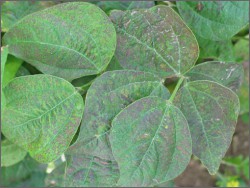O-zone Injury on Vegetables
Crystal Stewart-Courtens, Extension Vegetable Specialist
Eastern New York Commercial Horticulture

Common ozone symptoms are small, irregular, shaped spots that range in color from dark brown to black (stipple like) or light tan to white (fleck like). These spots are found only on the upper surface of the leaf. Very young and old leaves are less susceptible to ozone while newly mature leaves are the most susceptible. With severe damage, symptoms may extend to the lower leaf surface.
Insect feeding (red spider mite and some leafhoppers) produce flecks on the upper surface of leaves, much like ozone injury. Flecks from insect feeding are usually spread uniformly over the leaf surface while ozone flecks are concentrated in specific areas, usually most pronounced at the leaf tip and along the margins.
The most sensitive crops include: Bean, Broccoli, Muskmelon, Onion, Potato, Radish, Spinach, Sweet Corn, Tomato
Intermediate crops include: Carrot, Endive, Parsley, Parsnip, Turnip
Tolerant crops include: Beet, Cucumber, Lettuce

Upcoming Events
I thought I was covered for that! Farm Insurance Webinar Series, Jan-Feb 2026
January 13, 2026 : Session 1: Insurance and Risk Management 101
Insurance and Risk Management 101. This first webinar will cover many of the general provisions found in insurance policies and describe some of the terms to be aware of when you are considering your options. Steve Hadcock, Capital District Hort Team and Greg Murk, FarmNet.
January 20, 2026 : Session 2: Liability Insurance
Coverage for the risk that your business will cause harm to someone. Are you having people on your farm or selling a food product? You might need liability insurance. Robert Hadad, Cornell Vegetable Program, Elizabeth Higgins, Eastern NY Commercial Hort Program.
January 27, 2026 : Session 3:Protecting Yourself from Disasters (Crop Insurance, USDA FSA programs and Flood Insurance)
Are you protected from a weather event on your farm? Learn about your options for Disaster Coverage (crop insurance, FSA programs, flood insurance). Elizabeth Higgins, Eastern NY Commercial Hort Program.
February 3, 2026 : Session 4: Insuring People (health, life and disability insurance)
Options for health insurance, life insurance and disability insurance, and how they can help farmers and their employees. Maire Ullrich, CCE Orange County and Lucas Smith, Cornell Ag Workforce Development
February 10, 2026 : Session 5: Property Insurance
Insuring your infrastructure, equipment, and livestock from loss. Learn about the types of coverage, and the risks they reduce. Colin Hostetter, Tri-County Ag Team, Desiree Keever, CCE Delaware County and Steve Glick, Kevin Daniels Agency.
How to Diversify or Scale Up with Confidence for Profitability - Inspired by Annie's Project
February 4, 2026
February 11, 2026
February 25, 2026
Do you have an idea for a new enterprise to add value to your farm? Maybe you're considering scaling up for a potential market opportunity but just aren't sure if it's a good fit for your business. Join Cornell Cooperative Extensions of Allegany County, Broome County, Madison County, Onondaga County, Niagara County, Tioga County, the Niagara Small Business Development Center, and the Eastern NY Commercial Horticulture Team for a hybrid series on Wednesdays in February, starting on February 4th that will answer these questions and more. Annie's Project seeks to empower farm women through education, networks and resources. We welcome, and encourage, learning and sharing amongst farm women as we help you grow as decision-makers and leaders on your farm.
2026 Northeast Extension Fruit Consortium Winter Webinar Series
February 4, 2026 : Management of Up and Coming Strawberry Diseases in the Northeastern United States
Session 1: Management of Up and Coming Strawberry Diseases in the Northeastern United States
February 11, 2026 : Kiwiberry Production in the Northeast
Session 2: Kiwiberry Production in the Northeast
February 18, 2026 : Heat Mitigation- Sunburn and Fruit Coloring
Session 3: Heat Mitigation- Sunburn and Fruit Coloring
February 25, 2026 : The Dating Game- Updates in Lepidopteran Mating Disruption
Session 4: The Dating Game- Updates in Lepidopteran Mating Disruption
March 4, 2026 : USEPA Endangered Species Act Strategies and Pesticide Use
Session 5: USEPA Endangered Species Act Strategies and Pesticide Use
March 11, 2026 : Practical Drought Management for Fruit Growers
Session 6: Practical Drought Management for Fruit Growers












































